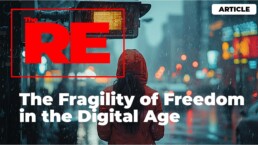The Ripple Effect
-News and Commentary-
The Fragility of Freedom in the Digital Age
- Home
- News and Commentary
- The Fragility of Freedom in the Digital Age
Share On Social

Today in The Ripple Effect, we are looking at a truth that many people sense but few want to face. Freedom in the digital age is not permanent. It is fragile. It is conditional. It is quietly being rewritten in real time by the technologies we use every day. We are not losing it all at once. We are giving it away, piece by piece, in exchange for convenience, entertainment, and a sense of belonging.
The Illusion of Infinite Freedom
When the internet first emerged, it promised something revolutionary. Unlimited information. Global connection. The democratization of speech, business, art, and politics. Anyone with a connection could speak to the world. Anyone with a good idea could find an audience.
For a while, that seemed true. Blogs exploded. Independent creators thrived. Activists organized across borders. But underneath the surface, power was consolidating. A handful of platforms grew faster and bigger than the wild early internet ever imagined. Google, Facebook, Amazon, Apple, and a few others became the new gatekeepers. They did not just connect users to information. They shaped which information users would see, how it would be ranked, and what would be rewarded.
Freedom on the internet started to look a lot more like freedom inside a shopping mall. You could walk around. You could look at what you wanted. But you were still inside a space someone else owned, governed by rules you did not write, enforced by algorithms you could not see.
Data as a Weapon
Freedom requires privacy. Without it, true autonomy disappears. Yet in the digital age, privacy has been quietly traded away. Every click, every scroll, every keystroke becomes part of a massive data profile. That profile is bought, sold, analyzed, and used to predict and influence behavior.
At first, this seemed harmless. Personalized ads. Targeted recommendations. Smarter search results. But data does not just sell products. It shapes narratives. It decides which stories rise and which vanish. It tailors news feeds not to what is important, but to what is profitable. It builds psychological profiles that can be used to sway elections, seed division, and even predict protest movements before they start.
When data is weaponized, freedom is compromised. Choices feel free, but they are often carefully nudged by forces users cannot see and would not easily recognize.
The Rise of Digital Authoritarianism
It is tempting to think of digital threats to freedom as something happening elsewhere. In authoritarian countries, surveillance technology is used openly. Cameras on every corner. Social credit scores. Internet blackouts. Arrests based on online activity.
But the line between open democracies and digital authoritarianism is thinner than it appears. In many Western countries, governments quietly expand surveillance powers under the banner of national security. Companies cooperate with law enforcement. Private sector data mining blurs with public sector surveillance. The infrastructure for control already exists. It is just waiting for the right political moment to be turned fully inward.
Freedom is not just about what is technically allowed. It is about what is practically possible. When speaking out risks algorithmic deplatforming, when organizing risks data profiling, when dissent risks digital erasure, freedom becomes a theory more than a reality.
The Shrinking Public Square
Another threat to digital freedom is the disappearance of true public spaces online. Early internet forums, open comment sections, and peer-to-peer networks have been replaced by curated feeds, branded experiences, and monetized communities. Algorithms filter who gets heard. Monetization pressures favor sensationalism over substance. Terms of service documents, thousands of words long, govern every interaction.
The new digital town squares are privately owned and profit driven. Free speech exists, but only within the boundaries of brand safety and shareholder value. Communities can be demonetized, throttled, or deleted without warning. Appeals are slow and opaque. Decisions are often final.
This does not just impact controversial figures. It shapes the very definition of acceptable discourse. It creates chilling effects where users self censor not because they must, but because they fear losing access to the platforms that now define modern life.


The Psychological Cage
Perhaps the most insidious erosion of freedom happens not externally, but internally. Constant surveillance, even if passive, changes behavior. Knowing that every post, every comment, every photo could be screenshotted, archived, or resurfaced years later leads to a kind of internalized censorship.
People begin to curate not just their public selves but their private thoughts. They perform for invisible audiences. They fear saying the wrong thing, liking the wrong post, or supporting the wrong cause. Freedom becomes less about the absence of external control and more about navigating a complex, shifting maze of unspoken rules.
In a surveillance society, conformity often becomes a survival strategy.
Small Choices, Big Consequences
The erosion of digital freedom rarely happens in dramatic moments. It happens through small choices. Accepting terms and conditions without reading them. Using platforms that harvest more data than necessary. Prioritizing convenience over control. Choosing engagement over reflection. Believing that because something is easy, it must be harmless.
Each small surrender does not feel like much. But collectively, they build a system where freedom is no longer the default. It is a privilege, granted by private companies, and contingent on behavior that fits the algorithm’s definition of acceptable.
The Way Forward
The good news is that awareness is growing. Encryption tools, decentralized platforms, and digital rights movements are pushing back. More users are demanding transparency, ethical data practices, and real choice. Some governments are beginning to regulate the excesses of tech monopolies, though often too slowly and with too many loopholes.
The future of digital freedom will not be decided by one policy or one technology. It will be decided by millions of small decisions made by users, builders, lawmakers, and communities.
Choosing privacy even when it is inconvenient. Supporting platforms that respect user rights. Advocating for laws that prioritize citizens over corporations. Building networks that resist centralization and promote real autonomy.
Freedom in the digital age will not survive on autopilot. It must be defended, rebuilt, and reimagined every day.
The Ripple Forward
The internet gave humanity an unprecedented gift, the ability to connect across distance, share ideas instantly, and build communities beyond geography. But every tool can be used or abused. Every freedom can be expanded or eroded.
The real question is not whether technology will shape the future. It is whether we will shape technology to serve freedom, or allow it to quietly reshape freedom to serve itself.


